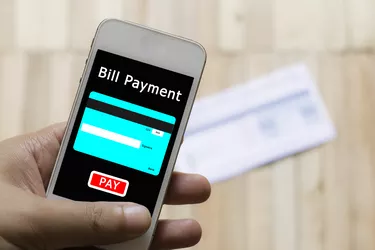
If you have a savings account but no checking account, you can often still pay bills online either through your bank's bill pay feature or through the website of the company where you owe money. Note that many savings accounts limit how many withdrawals you may make per month. If this is an issue, consider using a checking account, money market account, prepaid cards or money orders to pay bills.
Pay Bills With Savings Account
Video of the Day
You may be asking, "with a brick-and-mortar bank or online savings account, can you write checks or pay bills directly from it?" The answer typically depends on your bank or credit union, but it's often possible to pay bills, such as utility and credit card bills, using the routing number and account number of your savings account. A routing number identifies your bank, and your account number identifies your account within the bank. Most online funds transfer systems between banks in the United States use these numbers to identify your account as the place to withdraw or deposit money.
Video of the Day
If you're paying a bill to a big organization, like a utility company or credit card issuer, check to see if you can provide a routing number and account number through the company's website or mobile app to pay your bill. Make sure you have sufficient funds in your savings account to pay the bill so you don't get hit with penalty charges from your bank or from the company you are paying. Be careful about where you share your bank account numbers since fraudsters can potentially use your account number to steal money from your account.
Savings Account Transaction Limits
One big downside to paying your bills using a savings account is that many savings accounts limit you to six transactions per monthly statement cycle. This is to comply with a Federal Reserve regulation, and many banks will either stop additional transactions altogether or charge you a penalty fee if you exceed this limit. Some banks may impose stricter limits, and some will exempt in-person and ATM withdrawals from your account.
If there aren't limits on cash withdrawals, you may wish to pull out cash from your account and use money orders or cash payments for certain bills. However, using your savings account for too many routine bill payments could hamper your ability to deposit to your savings account or make other withdrawals. You could also find yourself unable to make a regularly scheduled bill payment or paying a hefty penalty if you rely on your savings account as a source for funds for bill payment and exceed the limit based on other transactions.
Other Bank Account Options
In addition to transaction limits, savings accounts typically don't come with checkbooks or debit cards, which can make them more of a pain to use for ordinary bill payments and other transactions, like buying groceries and other necessities.
If you find yourself hamstrung by the rules of your savings account, consider opening a checking account as well. Checking accounts typically don't have monthly transaction limits and often have useful features like debit cards for making payments in stores and online, ATM access and online bill pay features. Some checking accounts may charge monthly fees, but others do not, and some will waive fees based on your account balances or if you perform certain types of transactions, like receiving direct deposit payments from your employer.
Money market accounts are a kind of hybrid of checking and savings account. They often still have the six-transaction limit, but they also can have debit cards and check writing capabilities.
Another option is to use a prepaid debit card for bill payments and online and offline transactions. These can also carry fees so make sure you understand the terms of a card you're considering to avoid surprises.